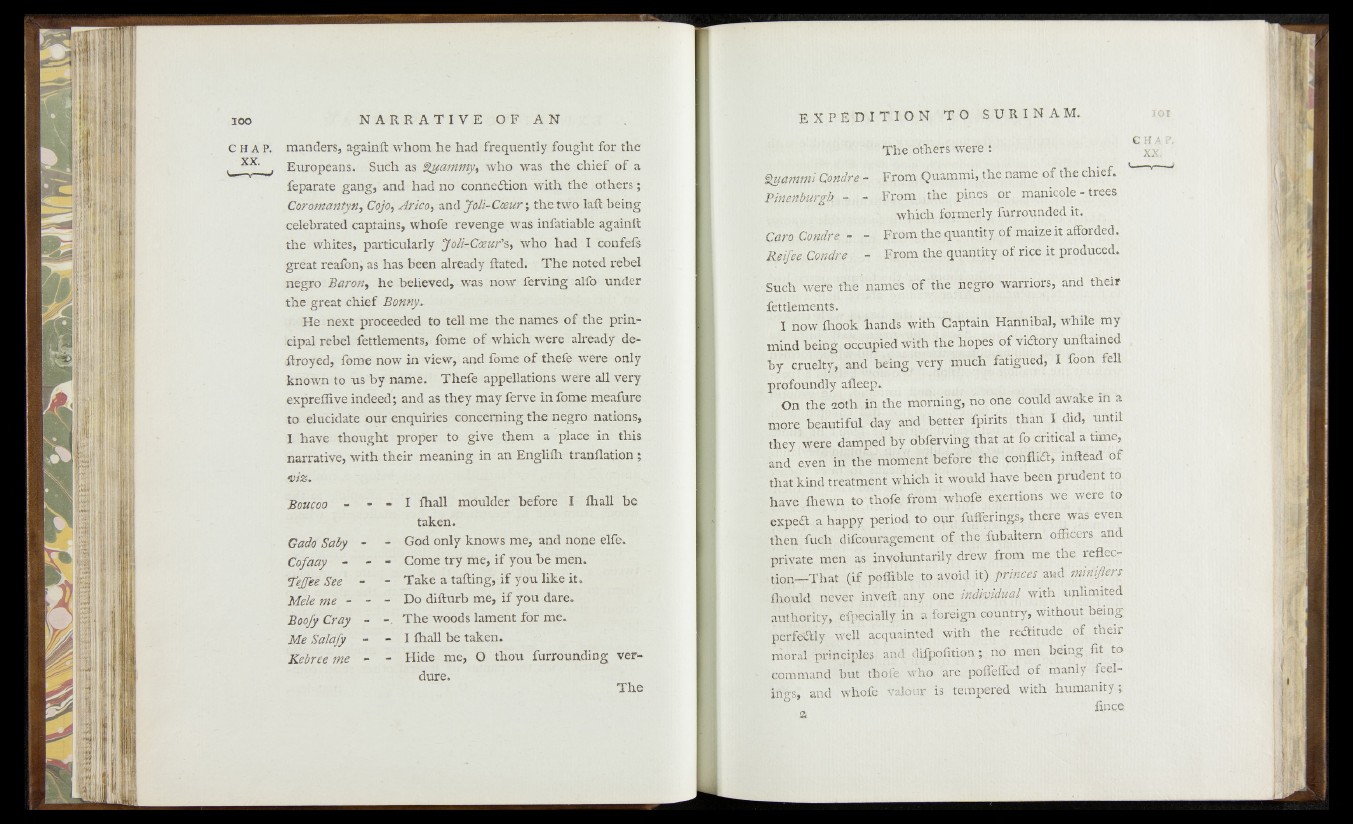
manders, againft whom he had frequently fought for the
Europeans.-^fiuch, as Shammy, who was the chief-erf a
feparate gang, and had no conne6tion with the others;
; C&romantyn, Ceja, \dtica,zn& Joti-Cmur; the two daft being
celebrated captains, whofe revenge was infatiable againft
the-whites, particularly ^eS^Cmpfi, %ho ffi&d I confeS
great reafbn, as has been already toted. The noted rebel
negro Baron, h e believed, was now ferving |alfo under
the great chief Bonny.
He-next proceeded to tell me the names o f the principal
rebel feltleiaents, feme o f which were J already destroyed,
ferae now in view, and lame o f .thefe.-w£re only
known to us by name. Thefe appellations were all very
expreffive indeed; and as they may ferve in fome meafure
to elucidate our enquiries concerning the negro nations,
1 have though! proper to give them a place in this
narrative, with their meaning in an Englifh traaflation;
v iz .
Bouc oo -
G add Saby
Cofaay -
Ÿéjféë See
Mêle me -
Boofy Cray
Me Salafy
Kebree. nie
I Ihail moulder before I lhall be
taken.
God only knows me, and none elfe.
Come try me, i f you be men.
Take a tafting,.if you like it.
Do difturb me, i f you dare.
The woods lament for me.
I lhall be taken.
Hide me, O thou furrounding verdure.
E X P E D I T I O N T O S U R I N A M.
W The o^&eŸs’iVerel
Quammi Çofdfi’f c <. From Quammi,the name of the chief. ;
Pinenburg b , -? ,, 7 , -Fçorq. i} tl^e,, pipes or mapicole - trees.
whi.c|i formerly fprrounded it.
Çaro Çondre - - From the quantity o f maize it afforded.
Reifey,fiqn4r,y - From the quantity o f rice it produced.
Such Verb the parues of ;the negro 'warriors, and their
feulements.
‘ I * now" W o k hands with' Captain Hannibal, while my
mind being f occupied with the hopes' of viétory unftained
by' cruelty,, apd heing/verÿ &^ch,fatigüed,’ I Toon fell
profoundly af^eep.
On the ,20th 'hr the morning, no. one could awake lh a
more bW t ifp ld k y and hpter fplrits than I did, until
they were damped by dhferying that at fodritical a time,
and e.ven in the'moment before the conffia, iùftead o f
that kind treatrpent w^icfe^t would have been prudènfto
have fhewn to thofe from whofe exertions jwe were to
expea .a happy period to our fufferings, there was even
then fuch difcouragemept of the -fubaltern officers and
private men as involuntarily drew from me the reflection—
That (if poffible to ayoid it) awd
fliould never inveft jj any .one jndividuaj with unlimited
authority, especially in a'foreign country, without being
perfectly well acquainted with the rediitude , of their
moral principles and çUfpofition ; ! no men being ‘fit to
command but thofe who are poffeffed of tfia-nly ^feelings,
and whofe valour is tempered with humanity ;,
t t i .■ ■ I \ ' I fince.